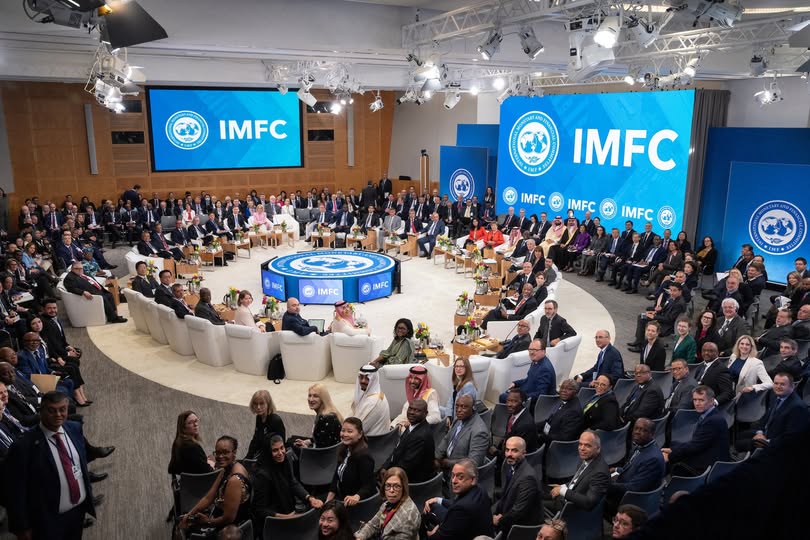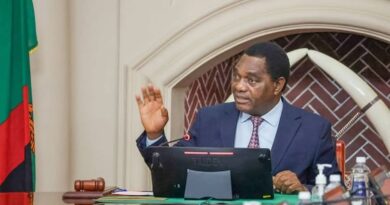IMFC Calls for United Action to Tackle Debt, Trade Tensions, and Economic Risks
The International Monetary and Financial Committee (IMFC) concluded its Fifty-First Meeting in Washington, D.C. on April 25, 2025, in a session marked by economic urgency and geopolitical complexity. Chaired by Mohammed Aljadaan, Minister of Finance of Saudi Arabia, the IMFC issued a strong joint statement reaffirming the IMF’s critical role in stabilizing the global economy amid mounting uncertainty, rising trade tensions, and ongoing global conflicts.
The meeting, held over two days, brought together finance ministers and central bank governors representing the IMF’s 190 member countries. The Committee confronted a volatile global landscape shaped by rising geopolitical tensions, stubborn inflation, high debt burdens, and digital and demographic transitions. While acknowledging the IMFC’s limited mandate in resolving conflicts, members emphasized that sustainable peace, aligned with the UN Charter, is indispensable for global growth and stability.
“We are at a pivotal juncture,” Chair Mohammed Aljadaan said. “The IMFC stands united in confronting current headwinds and reaffirming our commitment to multilateral cooperation, inclusive economic recovery, and the resilience of the international monetary system.”
The IMFC warned that escalating trade tensions and ongoing wars are exacting a heavy humanitarian and financial toll on nations, further dimming already weak growth prospects. The Committee highlighted that while disinflation is expected to continue, it will do so more slowly, with risks remaining tilted to the downside. In this precarious context, members called for enhanced global coordination to avert a deeper slowdown and financial instability.
The Committee laid out a comprehensive policy roadmap aimed at reversing the low-growth, high-debt trajectory that has plagued both developed and emerging economies. Members pledged to pursue well-calibrated and communicated structural reforms to enhance private-sector-led growth, improve job creation, and foster innovation.
Recognizing the role of sound fiscal management, the IMFC called for “growth-friendly” fiscal adjustments that protect the most vulnerable while ensuring debt sustainability. Central banks were urged to remain focused on price stability, acting in a data-driven manner to contain inflation without derailing recovery.
“We must continue to monitor and address financial vulnerabilities while embracing innovation,” the statement read. “Only through joint action can we ensure the stability and resilience of the international monetary system.”
One of the key themes of the meeting was the growing debt burden faced by low-income and vulnerable states. The IMFC reaffirmed its commitment to the G20 Common Framework for debt treatment and expressed strong support for the IMF and World Bank’s ongoing efforts under the Global Sovereign Debt Roundtable.
The Committee welcomed the Poverty Reduction and Growth Trust as a crucial support mechanism and endorsed efforts to enhance debt transparency and sustainability, including through the forthcoming review of the Low-Income Country Debt Sustainability Framework (LIC-DSF).
The meeting saw renewed backing for the IMF’s role in offering analytical and evenhanded policy advice tailored to member-specific needs. Members expressed anticipation for several key reviews, including those of program design, conditionality, and the Global Financial Safety Net, as well as the Financial Sector Assessment Programs. These are expected to strengthen the Fund’s capacity to address macro-critical risks and ensure financial stability.
IMFC members also welcomed the IMF’s 2024 Capacity Development Strategy Review, which promotes more flexible and integrated delivery of support, particularly in resource mobilization and policy implementation.
A central outcome of the meeting was the unanimous adoption of the Diriyah Declaration, named after the historic Saudi Arabian town where IMFC Deputies convened earlier in April. The declaration outlines a path toward enhanced IMF governance and a stronger role for the IMFC as a consensus-building forum. It sets the stage for a new governance framework that is inclusive, transparent, and reflective of the shifting economic weight of member states.
The declaration calls for the timely implementation of the 16th General Review of Quotas (GRQ) and directs the IMF Executive Board to develop guiding principles for future quota and governance reforms by the 2026 Spring Meetings. These reforms are designed to protect the voices of the poorest members while rebalancing representation in line with global economic realities.
“The Diriyah Declaration is a forward-looking commitment to fairer governance,” Aljadaan stated. “It ensures that all voices are heard and that our institutions evolve to meet 21st-century challenges.”
As global economic uncertainty persists, the IMFC closed its meeting with a resounding message of solidarity and purpose. Members committed to reinforcing a rules-based, open international trade system, enhancing supply chain resilience, and addressing disruptive capital flows and global imbalances.
The Committee reaffirmed its full support for the IMF’s mandate, staff, and leadership. It emphasized the importance of diversity and regional representation within the Fund, including greater gender parity in leadership roles.
The next IMFC meeting is scheduled for October 2025.



